There’s a zillion of ’em now. I just spotted five at once on three different hummingbird feeders. No idea why this year of all years the air is full of yellow-orange birds. [Hit the links below ↓ too.] Metaphysical compensation perhaps.
This morning was hard. My wife looked at me and asked how we got trapped in this “funny little town.” I thought but did not say: because we didn’t plan for the future and I let you down and prices have tripled. Silence was sufficient and the moment soon passed.
Later I did speak. We could always move to a little college town in the Midwest, I said. Right now there are half a dozen beautiful older homes with big porches and nice yards for sale in such-and-such wherever. You’d never be able to stand it, she said. That’s probably true. Give up my dreams and share space with Trump voters. Nothing but white people. Hot sticky summers and endless gray winters. Drive two days to see mountains and be able to breathe again.
And then I persisted: I’d do it for you, I lied. She practically screamed. I grew up in the Midwest and I’m not going back.
In my heart of hearts I’m successful and we go wherever we want. I’m not too old to move and the future is bright. We both have new glasses and hearing aids and nice clothes. There are friends and vacations and nobody dies.
A JHF classic from June 7, 2004. My wife was living in Dubuque, IA taking care of her mother and teaching music. I wrote this after a visit. We were only able to get together several times a year back then.
“What do black widows look like?” asked the special guest from northeast Iowa.
The spider I found when entering the bedroom wasn’t one of those, but I crushed it anyway. You never know, and besides, it wouldn’t leave. (I usually let them be except with bare feet or bathtubs.) “That’s not a black widow. There is one in the bathroom, though,” I offered helpfully. There was, too, on a little shelf of net that spanned a corner near the floor beside the sink. I’d seen it earlier that evening and knew it had to go.
“What do black widows do?” she asked.
“They can bite. It’s sometimes fatal.”
I don’t know, I’m just crazy. I’d seen the shiny black arachnids before, of course. With these there’s never just the one. But I hadn’t absolutely identified it, though a glance is really all it takes. I probably would have left it there a while at least, and just watched out where I put my feet. But I couldn’t ask her to keep her foot out of the corner, just where she might stand to stretch up and reach for something on the shelf. So I found the web and peered close with my flashlight: a black widow, all right. I doused it with some Wal-Mart Windex, and it staggered back behind the boards that line the wall. “I think I got it,” I shouted.” An hour later it was back and perky as hell, so I flattened it with a fly-swatter.
* * *
Great big clattering cold darkness. All my bones are turned to soup. The only refuge is a night of sleep, dark within dark. Deep diving darkness, falling, dissolution. What is true for now, and what will be? I try to tell her what I am, and she tells me what I’ve done. We walk the line with great alertness, and something different opens up.
More surprises at the airport. The tanned face in the mirror was calm and looked like me. From somewhere I had fetched a lack of questions and I liked the feel. I passed my hands by half a dozen automatic sinks before one sprayed, then joined her in a different place. There was artwork on the walls, and we looked at two: a sculpture of a Southwestern singlewide and a painting of pioneer family looking out over an unseen New Mexico. There were rifles stacked against the wagon and a husband looking out across the plain, but the littlest girl was picking flowers in the foreground, and that’s what drew the eyes.
Something was both new and almost normal, like a younger parallel dimension. I watched her re-fasten her silver earrings on the other side of the security barrier, then wave and disappear.
Before I left the terminal, I lingered in a gift shop whose plastic Chinese flying pig was low on juice and flapped but didn’t fly. A nearby postcard caught my eye, so I bought two.
“Your ring, it’s inlay?” asked the Native salesgirl.
“Uh yeah, it’s Zuni.”
“Yes, I know … ”
I walked back to where I’d parked and rolled the windows down the way I like them: passenger side one-half, mine all the way, vent windows open. I had a drink of lemonade and a slug of Cuervo from a flask. Two dollars and three minutes later, I was on the freeway heading north. It was almost 100 degrees in Albuquerque but dry as yesterday’s toast, and nothing stuck. The wind was at my back, the motor hummed. I floated through town at 65, norteño accordion pumping through the FM turned up all the way. A large flat cloud put most of 1-25 North in shade until I pulled out into open country on the way to Santa Fe. I knew the temperature, but I wasn’t hot. Clouds and sun and sky and mountains did a dance together in my truck.
When I pulled into my driveway, the thermometer on the big elm tree read 75 degrees. Inside the thick adobe walls, the living room was 66. I had a snack, then decided that the light was too delicious to pass up and went outside to take a hike.
The mesa was a glory of warm evening air and yellow-pink, a living room for the gods, and there were pictures in the sky. I wasn’t the only one outdoors, either. A pair of ravens having too much fun to fly in a direct line corkscrewed slowly up the canyon. A young jackrabbit saw me and pretended to hide. When I heard coyotes moving closer as the light began to fade, I held a meeting with myself:
“What if you round a bend and find you’re in the middle of the pack?”
“Who cares, they won’t come after me.”
“Most likely not, but what if they did?”
“Well, then I’d fight. Fight fiercely!”
The answer was so obvious and true, I couldn’t help but laugh. I almost wanted it to happen, to feel my boot thudding into ribs and skulls. If my life were in danger, I’d give it my all, I would, without a question or a pause, and hope I got the most of every second. I looked around in all directions. I was getting most of what I wanted, and I knew the rest was in the bag.
A JHF classic! Originally published as “Pall of Flame” on 11/24/2003. Hard to read, even now that everyone is dead. The bitterness, the deprivation, oy. This was me, though, 16.5 years ago, when I lived here by myself. Can’t believe we haven’t moved yet. Where’s the intervention?
It’s 19 degrees at noon here in el Norte, requiring steady work to guard against the chill.
All morning long I’ve fed the fires, learning in the meantime that the mighty stack of wood outside won’t last till Christmas if this weather settles in. All I know is that it’s cold and awfully dry. Yesterday about this time the cold front rumbled in on 50 mph gusts and blew my trash can down the hill. I even took the feeder down, because it swung so much and spilled out all the seeds. I took a walk just as the snow began to blow (not fall), and that was plenty fun. The flakes were thick and blotted out the sky, but flying powder doesn’t stick to anything. The tiny drifts that gathered in the folds of my jacket quickly fell off or evaporated, leaving not a trace of dampness.
Right before the weather changed, I took a phone call from a trailer park in Tucson: “I thought you’d cut me out of your will!” the old woman exclaimed, projecting, as cold wet toads crawled down my back. Mothers always get another chance—it’s built into the system—so I told her of the progress I was making in my work and how I’d networked with the pros and gained an ally and a friend. Somewhere in a parallel universe I’ve learned to visit when I have to, congratulations followed with a smile. In this one though, she asked if I’d applied for food stamps or signed up for welfare yet, but I said it never crossed my mind. She also told me not to write about myself, which is of course precisely what I need to do.
Ironically, a few days earlier I’d already been reflecting once again about the family I come from. Some years before, my aunt had given me a dusty heap of family relics from Maryland for safekeeping. A few months ago I retrieved some of these items, books and knick-knacks mostly, intending to have another look and see if there was anything of value and no obvious family connection that I could sell. Would that there were! In dollar terms, the exercise was DOA, but just handling the stuff pulled up more than merely what was there.
As I opened packets of old letters tied together with scraps of thread—no ribbons or fresh string if cast-off bits would do—I thought about the way my now-dead uncle used to hover years ago, afraid the boy would get away with something valuable, whenever my grandmother allowed me to take some trinket from the attic. Later, when Granny was in the nursing home, he sold everything I’d ever really wanted out of her house to pay the bills. She was 99 and then some, and barely lived to be 100, so her savings would have easily sufficed. That was cash, however, and therefore sacrosanct. My grandfather’s roll-top B&O railroad desk I’d spent years playing with as a boy was not. It and every other thing I would have hung onto forever simply vanished, sold or auctioned off without a word to anyone, much less my grandmother. The poor woman, still living at the time and harboring the sad illusion she’d be going home when she “recovered,” evidently wasn’t worth consulting. And did I mention that my uncle was a doctor?
I wish the story ended there, but with the Farrs it never does. I was living in the same town at the time, and my only cousin on that side was down in Florida. Before either of us knew what was in the works, my uncle (her father) had struck a deal to sell his mother’s house to strangers, and at a bargain basement price at that. I might have bought the place myself, and my cousin certainly would have in a heartbeat, but she never had the chance.
The memories went scraping and clanging through my mind as I fingered the familiar bits and pieces. I saw nothing in the collection of any monetary value whatsoever—they only kept the junk—and only a few things that might have meaning for my siblings or my nieces and nephews. Then I chanced upon the saddest excuse for a wallet I had ever seen: inside were an 1862 greenback and a packet of “Clergyman’s Half-Fare Permit” cards from the West Virginia & Pittsburgh Railroad, dated 1899. Now this was interesting…
The Civil War Union currency was marked “Five Dollars, Government Bank” and I wondered if I’d stumbled on a fortune. Five minutes of Internet research showed that although Lincoln had had these printed by the train-load, the bill was still redeemable — at face value. Adjusted for inflation, I might have had a little something, but “face value” meant an unknown relative had seen to it that I would stand there, 141 years later, with a worthless piece of paper in my hand. I had to laugh at such a perfect symbol, so much like the ones I knew in all their witless self-importance. Something brayed in triumph deep inside my bones. I shuddered briefly, then shook it off. It had to have been that gene, the old one that marked the empathy quotient of a stone. But surely I was different: all those drugs, food additives, and cosmic rays—my DNA was damaged, mutated or corrupted. It had to be, I couldn’t be like them, or I would need to beat my brains out with a wrench.
Maybe the proof was right in front of me. The half-fare cards! I picked one up and held it to the light. There on the back it read, “NO STOP-OVER allowed on Clergyman’s Tickets.” Oh please. And then I pictured him, my great-grandfather, riding through the night from Pittsburgh to Parsons, WV all alone and cold in the back of the car. No chance to stop and stretch his heels, have a good hot meal, or spend the night. (No honey on the side in Elkins, either, unless he met her after preaching when he rode there on his mule.) So why had Granny saved the cards and tucked them in the shabby leather wallet with the folded greenback? Obviously she was proud of how her father got to ride for half the fare, ignominious privilege though it was. Proud of pain as well, I thought. The righteous sting of deprivation and going without.
In the end, as I was closing up the box, I remembered how my aunt had come to visit us that spring of ’99 when we were getting ready for our move out West, brave but terrified, not knowing how we’d get along. I’d always thought she’d help us, take some step to ease the transition, bless our new adventure and share in the excitement. Instead she pulled into the driveway, just off the road from Maine, walzed in through the kitchen door (without knocking) and yelled, “I’ve just become a millionaire!”—referring to her stock portfolio—then headed for the bathroom. Millionaire or not, when you gotta go, you gotta go, and that was all we got.
Sometimes I think a bonfire would be nice, the flames so hot they’d turn the bones and books and memories to fine gray ash. Out here it’s easy to imagine how the wind would come and blow the dust away, so dry and cold that not a bit would stick.
A JHF classic! Originally published 12/8/2003.
Maybe I should have been afraid, but I just wasn’t. The fact is, most mornings when I walk out to the road to get the paper, I do a special thing. Taking in the 80-mile view is one way to go to church, I guess, and the little ritual is a kind of centering that never fails to do some good, if I give myself over to the moment. That’s how it was on Sunday, and when my eyes dropped from the horizon, I saw something in the sagebrush. There’s almost never anything “in” the sagebrush, you understand, but this time there was: a partially-eaten vole, to be precise, still warm and bloody wet.
The wind blew strongly from the south and shook the branches, but the tiny carcass was firmly lodged. Back and forth it waved, like something in a dream you half-remember and try not to forget. It must have fallen from the sky, dropped by a raven or a hawk, or been accidentally lost by dueling magpies, I reasoned. Curiously excited, I walked quickly back to the house and grabbed my camera. For the next ten minutes I took picture after picture without really knowing why: it was just a little thing, or so it seemed, but I was totally consumed, even happy, without knowing who or what to thank.

Earlier in the week, it was the truck. Wonka-wonka-shudder, vroom. Wonka-wonka-bonk. I’d really almost had it. Every time I started off, it felt like the driveshaft was out of balance: a quiet little knocking coming up my left leg, and then away we’d go. Nothing major, just enough to dull the edge of my mechanical joy. I’m sensitive to this stuff, though, and it had been that way for several weeks. I kept thinking, I’ll have to take the Ford to Lorenzo. And then I’d say to myself: but Lorenzo’s shop is 15 miles away. He could maybe drop me off in town, but how would I get down to Llano, much less make it back when he was done? Getting cars fixed is just one advantage to having two and not living by yourself, I’d think, and then feel dumb and lonely. Imagine going round and round like that, just from letting out the clutch.
Sitting at an intersection a few days ago, I blipped the throttle once or twice, more out of boredom than anything else, and felt the lumpiness again. Except now the clutch was depressed, which meant who cared about Lorenzo? I quickly deduced that the engine was actually missing slightly in a certain RPM range, though not if I held the revs to just that speed, only if I ran it up and down. How odd, I puzzled, but maybe this was something I could fix myself.

When I got home, I raised the hood and checked the distributor. Sometimes overlapping spark plug wires can cause a misfire if the insulation is cracked, but everything seemed fine. Acting on impulse, I leaned over the fender and pressed the distributor ends of the wires with my thumb, one at a time, to see if any were loose. The last one I got to was the only one that moved a tiny bit, but I heard and felt a “click” and cried “AHA!” Sure enough, when I climbed inside and turned the key, the engine roared to life with one less crankshaft turn, and when I gently let the clutch out, four thousand pounds of truck eased off without a stumble.
A few days later, I found the offering in the sage. Before I sat down here to write about it all, I looked out toward the mountains. In the uppermost branches of a leafless aspen sat about a dozen magpies, all facing the same direction: a magpie armada, glinting in the setting sun… I thought to myself: they can’t see me, but I’ll bet if I reach for my camera, they’ll all fly away! My hand touched the case, and three took off. I loosened the lens cap, and four more were gone. They know.
Early today it thundered ice pellets for half an hour and then began to snow. Throughout the morning, everything was blotted out by swirling white, and then the sun came out. I looked to the west and saw more clouds come rolling in. (Snow seen from the side looks dirty gray unless it’s in the light and then it gleams like it’s on fire.) Twenty minutes later all was gray and still again, and a subtle prickly mist began to fall. Just now I raised my eyes and ice came down for half a breath.
If I drop dead tomorrow, remember I’m okay. But stay away, I tell you, stay away: something’s going on here that may leave my heart exploding with a roar.

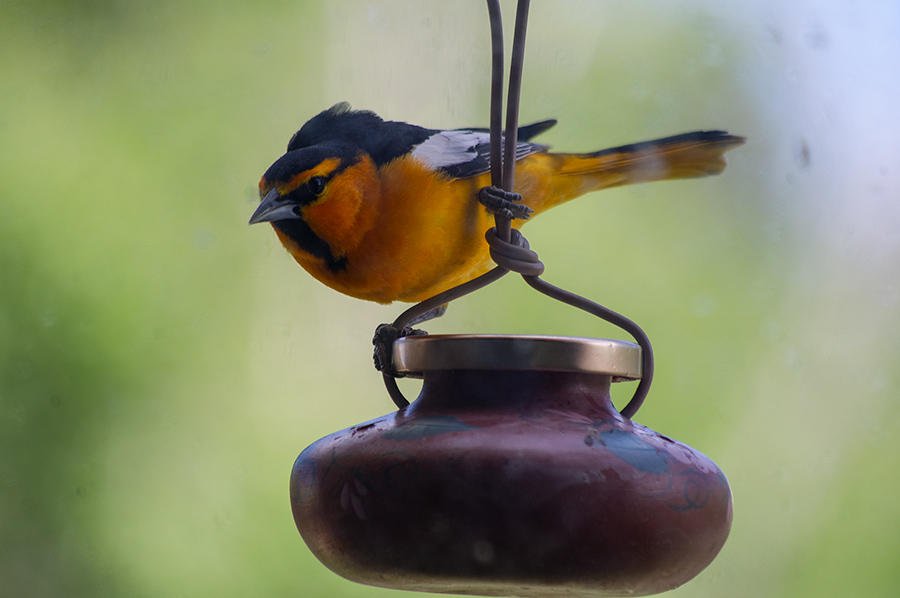
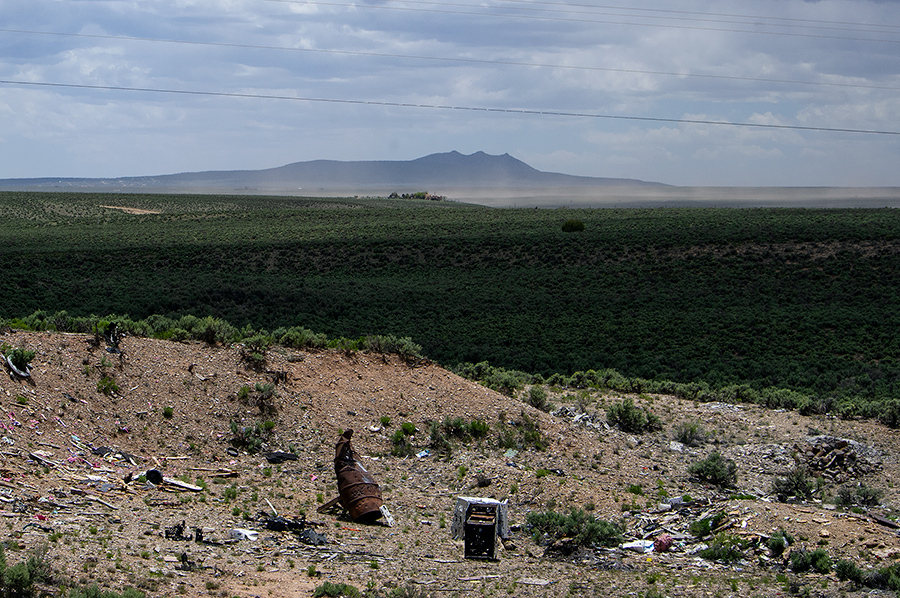
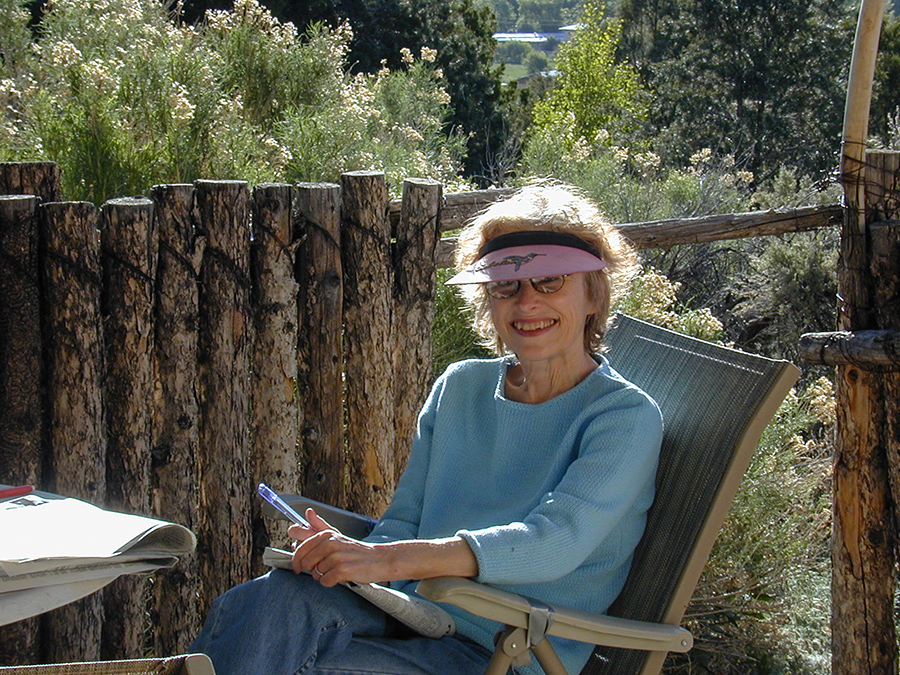
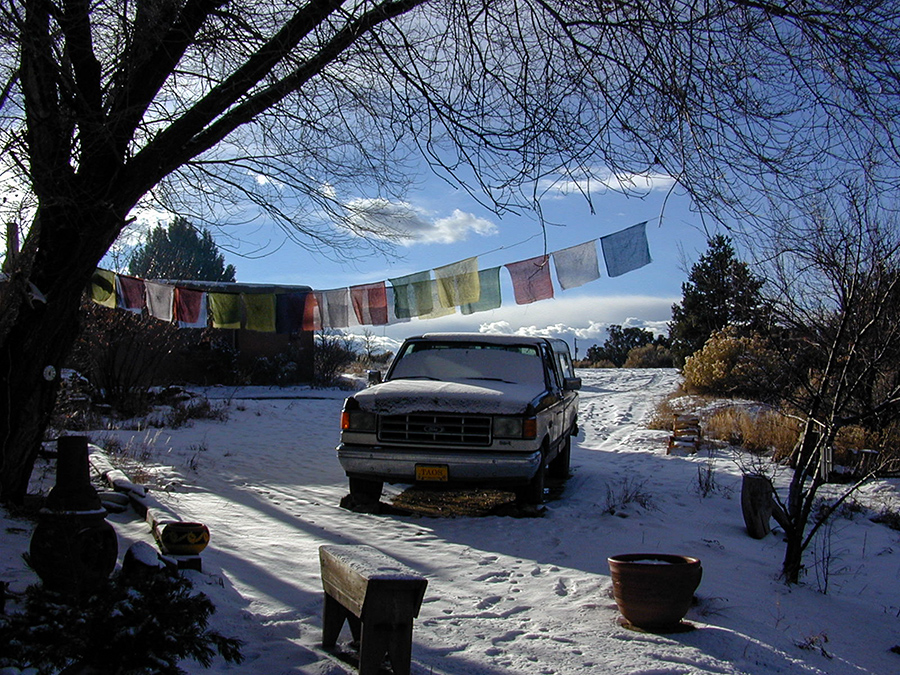
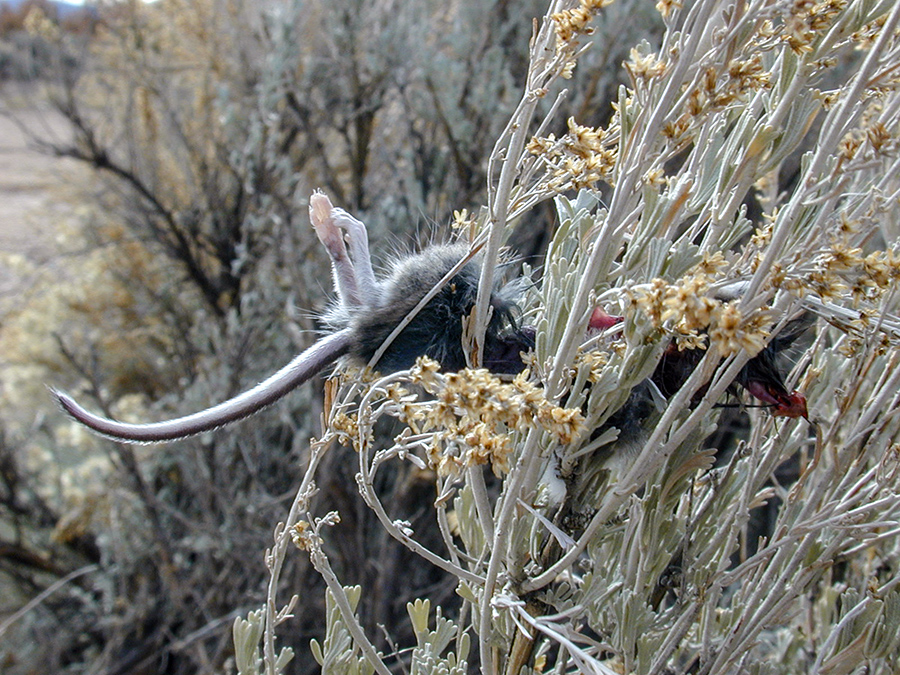
.png)